

Correlation of US stocks highest since 1987 crash. Ellen Brown on economic, financial and monetary transformation. Book of the Week: Charles Eistenstein’s Sacred Economics is out! Every new epoch needs its adapted spirituality.

A good candidate for a positive affirmation of a p2p spirituality is this book from marvelous author and speaker Charles Eistenstein, whose earlier The Ascent of Humanity offered a most profound critique of the current system. Here, he describes the positive alternative. “Why is it that whenever I investigate the causes of any phenomenon that bothers me, whether it is nuclear waste, the prison industry, or the dissolution of community, I dig down one or two levels and I get to money? Why is money a force for evil in the world? And why has it so often been a force for evil in my own life, discouraging me from doing what I love, encouraging me to devote my gifts toward things I don’t care about?
Bernard Lietaer and Christian Arnsperger on reinventing the financial system. Via: What is the structural cause of the financial crisis and what is its structural solution?

1. Watch the video from monetary transformer Bernard Lietaer, from TedX Berlin: 2. Listen to the audio podcast interview here. The Bitcoin Epoch: It is Akin to the Printing Press Revolution. News has been filtering in about the problems that are besetting a virtual currently called Bitcoin.
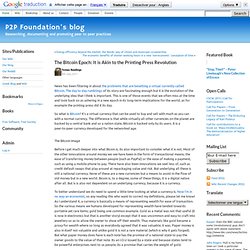
The day to day rumblings of its story are fascinating enough but it is the evolution of the underlying idea that I think is important. This is one of those events that we often miss at the time and look back on as ushering in a new epoch in its long-term implications for the world, as for example the printing press did it its day. So what is Bitcoin? It’s a virtual currency that can be used to buy and sell with much as you can with a normal currency. L019: Bitcoin P2P Currency: The Most Dangerous Project We've Ever Seen - Launch - Solid discussions of this piece on BoingBoing.net, Hacker News, Slashdot and Reddit.

Rob Tercek has a follow up to this piece here. by Jason Calacanis and the LAUNCH team A month ago I heard folks talking online about a virtual currency called bitcoin that is untraceable and un-hackable. Folks were using it to buy and sell drugs online, support content they liked and worst of all -- gasp! -- play poker. Edgar Cahn - 2 impulses of human nature and corresponding money systems. Kevin Carson on Bitcoin and the Phyles: dystopia or utopia? “Neal Stephenson’s “The Diamond Age” was set some years after encrypted currencies and e-commerce removed most economic transactions into darknets beyond the government’s capability of monitoring and regulating, and thus caused tax bases around the world to implode.
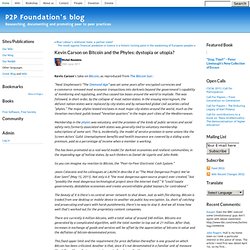
This was followed, in short order, by the collapse of most nation-states. In the ensuing Interregnum, the defunct nation-states were replaced by city-states and by networked global civil societies called “phyles.” The major phyles leased enclaves in most major city-states around the world, much as the Venetian merchant guilds leased “Venetian quarters” in the major port cities of the Mediterranean. Membership in the phyles was voluntary, and the provision of the kinds of public services and social safety nets formerly associated with states was generally tied to voluntary membership subscriptions of some sort.
This is, incidentally, the model of service-provision in some unions like the Screen Actors’ Guild. The minimum wage, demurrage and the economics of labor. The minimum wage, demurrage and the economics of labor Sepp Hasslberger 17th June 2011 What I am about to summarize or, more or less faithfully record, here is a discussion on facebook which should be available for future reference … temporary as they are those traces that remain of our social networking interactions and exchanges of ideas and views.
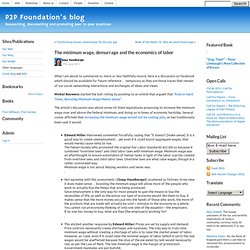
Michel Bauwens started the ball rolling by pointing to an article that argued that “Even in Hard Times, Boosting Minimum Wage Makes Sense”. The article’s discussion was about some US State legislatures proposing to increase the minimum wage over and above the federal minimum, and doing so in times of economic hardship. P2P Foundation. Book of the Week (2): The History of Stamp Scrip. This very well written introduction to why we need differently designed currency has an interesting review of historical experiences, in particular how evolutions after the meltdown of 1929 could help find solutions for the meltdown of 2008.
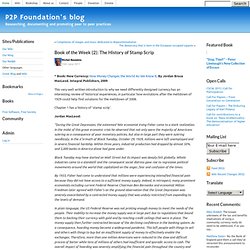
Chapter 1 has a history of ‘stamp scrip’. “During the Great Depression, the esteemed Yale economist Irving Fisher came to a stark realization. In the midst of this grave economic crisis he observed that not only were the majority of Americans su! Ering as a consequence of poor monetary policies, but also in large part they were su! Ering needlessly. Black Tuesday may have started on Wall Street but its impact was deeply felt globally. By 1933, Fisher had come to understand that millions were experiencing intensified financial pain because they did not have access to a sufficient money supply. In plain language, the US Federal Reserve was not printing enough money to meet the needs of the people.
Is Ripple the Future of Money? « webisteme. Ripple is an open source project to create a new type of decentralised currency based on trust between friends.
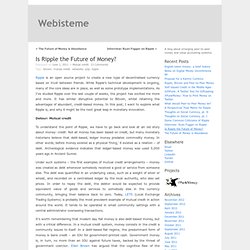
While Ripple’s technical development is ongoing, many of the core ideas are in place, as well as some prototype implementations. As I’ve studied Ripple over the last couple of weeks, the project has excited me more and more. It has similar disruptive potential to Bitcoin, whilst retaining the advantages of abundant, credit-based money. In this post, I want to explore what Ripple is, and why it might be the next great leap in monetary innovation. Detour: Mutual credit. The Ripple mutual credit and payment system: Will It Work? Should it work, its consequences would be great.
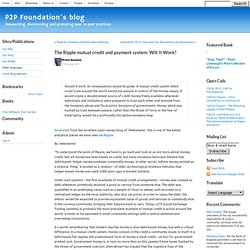
A mutual credit system which could scale around the world would put people in control of the money supply. It would create a decentralised source of credit money freely available whenever individuals and institutions were prepared to trust each other, and immune from the monetary abuse and fiscal policy decisions of governments.
Money which was backed by trust between people, rather than the threat of force or the fear of bankruptcy, would be a profoundly disruptive monetary leap. What Bitcoin Is, and Why It Matters. Unlike other currencies, Bitcoin is underwritten not by a government, but by a clever cryptographic scheme.
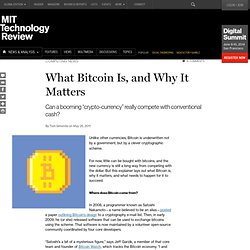
For now, little can be bought with bitcoins, and the new currency is still a long way from competing with the dollar. But this explainer lays out what Bitcoin is, why it matters, and what needs to happen for it to succeed. Where does Bitcoin come from? In 2008, a programmer known as Satoshi Nakamoto—a name believed to be an alias—posted a paper outlining Bitcoin’s design to a cryptography e-mail list. Can Ripple credit routing develop into an actual currency? The world of alternative currencies is abuzz right now with discussions of the pros and cons of Bitcoin, a peer-based currency that is being “mined” using the capability of computers to solve a complex mathematical problem. A good summation of the discussions is on Quora, in the different answers to the question: Is the cryptocurrency Bitcoin a good idea? There is also speculation on how bitcoin, or rather the development of crypto-currencies, will influence and profoundly change our economic thinking, especially our way of taxing.
Square Tries to Make Wallets Obsolete. Square's new apps allow consumers to pay their bills without swiping a credit card. But the company has competition. On Monday, Jack Dorsey, Square’s co-founder and chief executive, announced a way for shoppers to pay by simply giving their name to the merchant. Mr. Dorsey, who also co-founded Twitter, said customers would use a new feature on Square’s or apps, called Card Case, to make payments. Merchants would use one called Register to ring up and track purchases. Rethinking taxes and welfare in a cryptocurrency world. The relative early success of Bitcoin in the world of hackers, means that cryptocurrencies will be coming in a decade or so. It’s urgent to rethink taxes and welfare, thinks Swedish Pirate Party leader Rick Falkvinge in this excerpt: “From a political perspective, this development means that taxation and welfare systems must be rethought and rewired considerably and immediately.
Cryptocurrency brings new challenges to the table. The government can’t see the wealth of an individual, nor their inflow or outflow of funds, not with any amount of applied force. I know a lot of individuals in government will react with normalcy bias to this statement and say “but we have to!”. This means that neither taxes nor social support systems can be based on income or wealth. We’ll arrive at this point within a decade. So taxation first, then. This leaves us with a couple of other things we can tax. Oh, and we can tax consumption. But there are also drawbacks, of course. Sean Corrigan On The Inflationary Diabolus Ex Machina, And Bernanke As The Modern Incarnation Of Shiva, the Shatterer of Worlds.
Meet the System That Will Collapse the U.S. Dollar (Part 1) Over the last few articles, I have explained the reality of peak oil. However, this is just one factor of America’s looming energy crisis. Another major component that is vital to understand is something known as the breakdown of the Petrodollar system. Today, I will begin explaining exactly what this system and why you should understand it. In the early 1970’s, the international gold standard had collapsed, and America was beginning to live far beyond its means. Franz Hoermann – “The death of money – electronic money” (This is a long, unbroken excerpt from “The End of Money”, about as long as I dare go in one unbroken stretch, out of politeness, and despite the author's generous permission, but this is a passage I personally found very helpful. It covers a lot of important ground quickly and clearly, and links with many other aspects of our money predicament.
I hope you get as much out of it as I have. Now over to the Professor...) “In 1993, Joel Kurtzman, former editor of The Harvard Business Review, authored “The Death of Money: How the Electronic Economy Has Destabilized the World's Markets and Created Financial Chaos”. In this work he points out how investment bank business practices themselves have changed in the electronic age. But do moral considerations impinge on us when we trade anonymously?
The ephemeralization of value. Bitcoin in the real world – supply and demand. Hyperinflation: The Story of 9 Failed Currencies. Social economic networks and the new intangibles. Peer-to-peer currency takes banks out of the picture - Springwise. Positive Money - Fixing Social & Economic Problems by Ending Fractional Reserve Banking. Written by Ken MacIntyre (Guest Author) on . Inspired by Ha Joon Chang’s 23 Things They Didn’t Tell You About Capitalism (2010) (where you learn for example that the Nobel Prize for Economics is not really a Nobel Prize: it is awarded by the Swedish Central Bank). 1. Governments in full sovereign control of their currencies can create sufficient money to ensure full employment and to finance all their activities. There is no limit to money creation and to say that ‘there is no money left’ is as absurd as it is untrue. 2. 3. 4. 5. 6. 7. 8. 9. 10. 11. 12. 13. 14. 15.
Sources C H Douglas Social Credit (1924)Warren Mosler – The Seven Deadly Innocent Frauds of Economic Policy (2010)A. Join the 24,792 of us who know that our money system needs fundamental changes if we want an economy that works for people, not banks. Trackback from your site. Ken MacIntyre has MAs in political science and social and political theory from Edinburgh and London (Birkbeck) Universities.